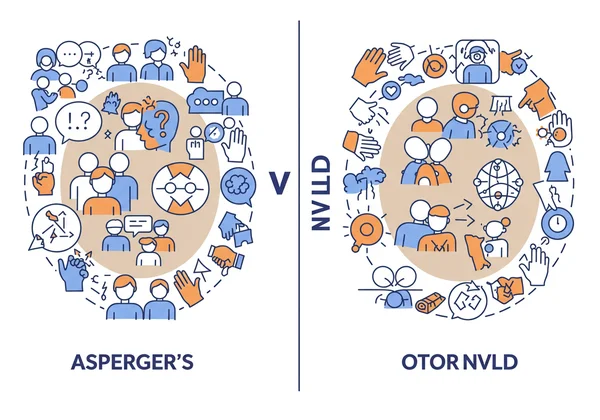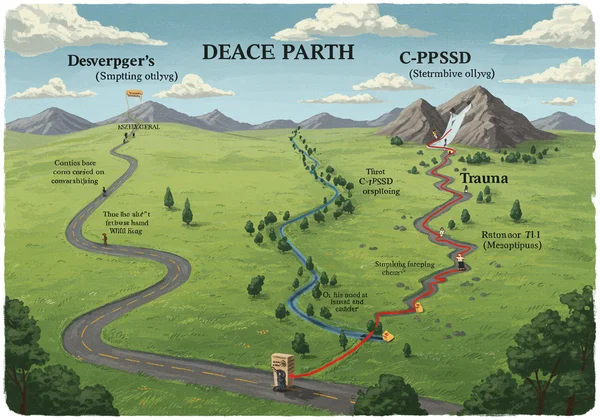Asperger's Test: Conditions Often Mistaken for Asperger's
September 29, 2025 | By Jasper Finch
Navigating the journey of self-discovery can be complex, especially when you encounter traits in yourself or a loved one that suggest a unique way of experiencing the world. You might be researching online, trying to answer questions like, "What are the symptoms of undiagnosed Asperger's in adults?", and finding information that feels both familiar and confusing. If you've been exploring the possibility of Asperger's syndrome, you're not alone. The first step towards clarity often begins with a reliable aspergers test, but it's also crucial to understand that several other conditions share similar traits, which can lead to uncertainty.

This guide is designed to help you navigate these complexities with empathy and clarity. We'll explore some conditions that are often mistaken for Asperger's, helping you gain a more nuanced understanding of your own experiences. This knowledge empowers you to take the next step, whether that's further research, seeking professional advice, or taking a thoughtful online screening tool to gather more personal insights.
Why Misdiagnosed Asperger's Is a Common Challenge
The path to understanding any neurotype is rarely a straight line. Many adults who identify with Asperger's traits spend years feeling different without knowing why. The overlap in symptoms between various conditions is a primary reason for this confusion, making a careful and informed approach essential.
The Overlap: Shared Traits Across Different Neurotypes

Many conditions can present with characteristics that look like Asperger's syndrome. Traits such as social awkwardness, intense focus on specific interests, sensory sensitivities, and difficulties with emotional regulation are not exclusive to the autism spectrum. This shared traits phenomenon means that surface-level observations can be misleading. For true self-understanding, it's vital to look deeper than the "what" and explore the "why" behind these behaviors.
The Importance of Nuance in Self-Assessment
While online resources are valuable, self-assessment requires careful consideration. It's easy to fall into a confirmation bias, seeing only the evidence that supports an initial idea. Recognizing the subtle differences between conditions is key to avoiding misinterpretation. An effective screening tool can provide a structured framework for this exploration, offering a valuable data point on your journey. For a scientifically-backed starting point, you might consider an Aspergers quiz online.
Asperger's vs. NVLD: Distinguishing Social from Learning Differences

One of the most common points of confusion is between Asperger's syndrome and Nonverbal Learning Disability (NVLD). Both can significantly impact social interaction, but their underlying causes and core features are distinct.
Core Characteristics of Nonverbal Learning Disability (NVLD)
Nonverbal Learning Disability is a neurological condition characterized by a significant discrepancy between strong verbal skills and weaker motor, visual-spatial, and social skills. Individuals with NVLD often have an impressive vocabulary and excel at reading and writing. However, they struggle with abstract reasoning, physical coordination, and interpreting nonverbal cues like body language, facial expressions, and tone of voice.
Key Differences in Social Cues, Motor Skills, and Perception
The key distinction lies in the pattern of strengths and weaknesses. While someone with Asperger's may struggle with the reciprocity of social interaction, a person with NVLD struggles more with the mechanics of it due to poor interpretation of social cues. Furthermore, individuals with Asperger's often have restricted and repetitive behaviors or interests, which are not a core feature of NVLD. Clumsiness or poor motor skills are central to an NVLD diagnosis, whereas in Asperger's, motor skills can vary widely.
Asperger's vs. C-PTSD: Unraveling Developmental vs. Trauma Responses

Another area of significant overlap is with Complex Post-Traumatic Stress Disorder (C-PTSD). While Asperger's is a neurodevelopmental condition present from birth, C-PTSD develops in response to prolonged, repeated trauma.
Understanding Complex Post-Traumatic Stress Disorder (C-PTSD)
C-PTSD results from enduring traumatic events over a long period, such as ongoing abuse or neglect. It can lead to profound difficulties in emotional regulation, relationships, and self-perception. Symptoms of C-PTSD include feelings of worthlessness, trouble with relationships, emotional flashbacks, and a persistent sense of being on high alert.
How Trauma Responses Can Mimic Neurodivergent Traits
The confusion arises because trauma responses can look very similar to Asperger's traits. For example, social avoidance in C-PTSD may stem from a fear of others, while in Asperger's it may be due to social overload or confusion. Sensory sensitivities in C-PTSD are often linked to hypervigilance (a state of being constantly on guard), while in Asperger's they are typically an innate part of sensory processing. Disentangling these requires exploring the origin and context of the behaviors, a process that a personalized AI report can help begin.
Other Conditions Similar to Asperger's and Their Distinctions
Beyond NVLD and C-PTSD, other conditions can also present with overlapping traits, further highlighting the need for a careful and thorough approach to self-discovery.
Brief Comparison: Asperger's and Schizoid Personality Disorder
Schizoid Personality Disorder (SPD) is characterized by a pervasive pattern of detachment from social relationships and a restricted range of emotional expression. Like some individuals with Asperger's, those with Schizoid Personality Disorder may appear aloof, prefer solitary activities, and seem indifferent to praise or criticism. The key difference often lies in motivation. A person with Asperger's might desire connection but struggle with how to achieve it, whereas a person with SPD typically has little to no interest in forming relationships at all.
When to Consider Professional Assessment for Clarity

While exploring these differences is an enlightening process, online tests and articles are tools for self-exploration, not diagnosis. If your research leaves you with persistent questions, seeking a professional assessment is the most reliable path to clarity. A qualified psychologist or psychiatrist can conduct a comprehensive evaluation that considers your full developmental history and differentiates between these nuanced conditions. Using a tool like our anonymous online test can provide a structured summary of your traits to share with a healthcare provider.
Your Journey to Self-Understanding: The Value of Informed Exploration
Understanding whether your experiences align with Asperger's or another condition is a profound step toward self-acceptance and empowerment. Recognizing the nuances between Asperger's, NVLD, C-PTSD, and other profiles allows you to seek the right kind of support and strategies tailored to your unique needs. This journey isn't about finding a label; it's about gaining the clarity to thrive.
Your path to insight is your own, and every step you take is valuable. If you're ready to explore your traits in a structured, private, and insightful way, we invite you to start your test on our homepage.
Frequently Asked Questions About Asperger's and Similar Conditions
Can I test myself for Asperger's?
Yes, you can begin your journey of self-discovery by using a screening tool. A self-administered Asperger's test can provide valuable initial insights by asking questions based on scientifically validated scales. It helps you organize your thoughts and identify traits that may warrant further exploration. Remember, this is a first step, not a final diagnosis.
How do I get tested for Asperger's syndrome by a professional?
To get a formal diagnosis, you should seek an evaluation from a qualified healthcare professional, such as a clinical psychologist, psychiatrist, or neuropsychologist with experience in adult autism spectrum disorders. The process typically involves detailed interviews, clinical observation, and standardized diagnostic questionnaires. Taking an online Aspergers test beforehand can give you a helpful summary to bring to your appointment.
How can you tell the difference between Asperger's and autism?
Historically, Asperger's syndrome was considered a separate diagnosis from autism. However, in the latest diagnostic manual (DSM-5), it is now included under the umbrella of Autism Spectrum Disorder (ASD). People who previously received an Asperger's diagnosis are now generally diagnosed with ASD, Level 1. The key difference was that an Asperger's diagnosis specified no delays in language or cognitive development.
What are the symptoms of undiagnosed Asperger's in adults?
Common signs in adults may include difficulties in social interactions and reading nonverbal cues, intense and highly focused interests, a preference for routines and predictability, and sensory sensitivities (to light, sound, or touch). Many adults also describe a lifelong feeling of being "different" or having to manually learn social rules that seem intuitive to others. Our free Aspergers test covers these areas in detail.